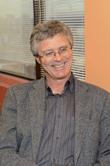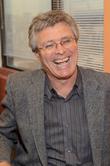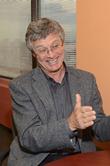


As some of you may already know, Ken Norrie, HEQCO’s first vice president, research, concludes his time with us in mid-December. HEQCO is all about evidence-based research, and the following staff-written tribute to Ken is clear evidence of his unwavering commitment to research, to higher education and to his many colleagues. I join them in thanking Ken for his extraordinary contributions, which have helped shape and guide HEQCO’s formative years. I hope you will add your own tributes to Ken in this blog’s comment section. Thanks for sharing…
Although he prefers flannel shirts and drives a dented 1999 Honda, HEQCO’s vice president Ken Norrie is a man of great precision, as becomes the founding lead researcher of a research enterprise. He is, after all, an economist, educated at the University of Saskatchewan and Yale. And so it is that the highest praise any at HEQCO can receive from Ken is this: “You are starting to think like an economist.”
Now in his final weeks with HEQCO, the former provost of McMaster University was a key member of the first string when HEQCO opened its doors in 2007. He hit the field with a vengeance that belied the double knee replacement he underwent just weeks into the job. After building the research team, and launching the research, his next challenge was, well, what to do with it? “The question was how could our research best inform public policy, and I admit I came in with the naïve view that it was solely a matter of the research being solid, rigorous and well written,” says Ken. “In fact, I would discover that got us only one-quarter of the way there.”
Over the next years, while his research team was Googling phrases like “human capital theory” and “common pool resources,” he was developing an abiding appreciation for other words like “communication” and “relevance” and even “politics.”
“I used to assume that the research would speak for itself, that the government would thank us profusely and adjust policy accordingly,” Ken recalls. “Over time, I came to understand that as researchers mandated to inform public policy debate, the onus was on us to explain clearly and simply what we found and why it mattered. I came to understand that part of our job was making our research relevant, keeping it out there, respecting the complexities of instituting policy change and accepting that some tension will exist when our work identifies policy shortcomings.”
Ken and his team learned well, now as seasoned in their presentations to government, colleges and universities as the research they present. “When I go back to teaching public policy, I will do it totally differently,” says Ken, who is also taking an administrative leave (deferred when he joined HEQCO) from his professorial duties at McMaster University. “As with education itself, it’s not just about knowledge,” he says. “It’s also about what you do with it.”
His recent and well-received report on tuition policy options – a virtual primer for informed discussion on Ontario tuition and financial aid – reflects that hard-earned sensitivity. “That was a fun paper to write and it pointed in an unexpected direction,” says Ken, “in how closely the current policy was conforming to full income contingency – which still might happen,” he adds mischievously.
Also during Ken’s watch: the creation of HEQCO’s @Issue papers – which synthesize the collective state of research on a given topic; and the annual Review and Research Plan, which offered a data-rich assessment of Ontario postsecondary access, quality and accountability.
As HEQCO’s first programmatic architect, Ken also solidified the agency’s role as a convenor of institutions and innovation – the merit of which is confirmed with every institutional “thank you…this is the first time I’ve had a chance to talk to someone about this.” And he can imagine the day when HEQCO’s adherence to a culture of assessment will be a key component of all postsecondary institutional operations.
His time with HEQCO also increased Ken’s appreciation for teaching. “I always knew professors were doing interesting things but I did not realize the magnitude of transformation in teaching that was underway, despite limited resources.” And the inner economist, who challenged the value of “a mere three observations,” today acknowledges that his HEQCO years have also confirmed the merits of qualitative as well as quantitative research.
Post-HEQCO, Ken plans to balance university work with family – ultimately moving his home base to Revelstoke, BC, where Mt. McKenzie offers “the longest vertical run in Canada,” he says with an economist’s precision and a skier’s elation.
For Ken Norrie, measurement matters, “and by all measures, Ontario’s postsecondary sector overall is doing very well,” he says. “It takes a long time to build a system as inclusive and high quality as it is, and it wouldn’t take very long for it to fall apart. But HEQCO exists in recognition of the importance Ontario places on higher education.
“The people are the thing,” he adds. “HEQCO is staffed by incredibly talented people. It’s a great place to work — a combination of professionalism and fun.” His research team members say they are better researchers and writers for their time with Ken. They say he was always an unfailing mentor and advocate. And they say they are now adept at using the term “regression analysis” in daily conversation.
Do you have a Ken Norrie anecdote or best-wishes greeting to share? Please post your comments below.
